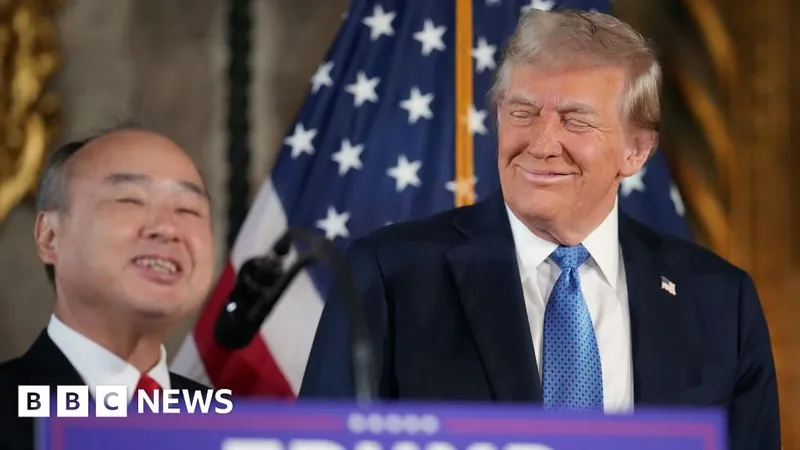
Japanese Billionaire Masayoshi Son Makes Bold $100 Billion Investment Pledge for US Jobs!
2024-12-17
Author: Yan
In a dramatic show of confidence in the United States economy, Japanese tech billionaire Masayoshi Son, CEO of SoftBank Group, has pledged to invest a staggering $100 billion over the next four years, vowing to create 100,000 jobs. This announcement came during a press conference alongside President-elect Donald Trump, who is actively courting global businesses in his bid to bolster the American economy.
Son, a figure often associated with both impressive successes and notable failures, was in high spirits as he laughed off attempts by Trump to escalate his investment commitment. However, skepticism looms as the details surrounding this ambitious plan remain scarce. SoftBank's recent financial health raises eyebrows—earlier this year, the company had approximately $30 billion in cash, calling into question the feasibility of such a significant outlay.
The buzz around artificial intelligence (AI) and investment in semiconductor technology has been prevalent recently; Son had previously hinted at a $100 billion venture in chips. Yet, with SoftBank's rocky track record—particularly its disastrous investment in co-working giant WeWork—many analysts are cautious about this latest promise.
Trump seized the moment to tout this investment announcement as a sign of renewed optimism in America's business landscape, which has reportedly gained momentum in recent months. The president-elect has expressed plans to leverage his presidency to attract foreign investments, including potential tax cuts and streamlined regulations that could facilitate large-scale projects.
However, Trump's proposed immigration reforms and tariffs on imports from major partners like China, Mexico, and Canada have raised concerns among prospective investors—could these regulations impact the very workforce needed to sustain Son's promised jobs? Moreover, there's fear that the rollback of Biden-era incentives for manufacturing and clean energy could deter investments.
The event echoes a trend from Trump’s first term characterized by flashy investment announcements. For instance, ambitious promises made by firms like Foxconn to create thousands of jobs in Wisconsin fell significantly short of expectations, reflecting a pattern of speculative announcements rather than concrete outcomes. The failed electric vehicle startup Lordstown Motors, which went bankrupt after Trump promoted it, serves as yet another cautionary tale.
Nevertheless, political figures from both sides of the aisle continue to champion business investments, often taking credit when ventures succeed. With Son's commitment, the stakes are high—will this be a turning point for American jobs and the tech industry, or just another instance of grand gestures failing to materialize? Stay tuned for what unfolds in this potential game-changing endeavor!


 Brasil (PT)
Brasil (PT)
 Canada (EN)
Canada (EN)
 Chile (ES)
Chile (ES)
 España (ES)
España (ES)
 France (FR)
France (FR)
 Hong Kong (EN)
Hong Kong (EN)
 Italia (IT)
Italia (IT)
 日本 (JA)
日本 (JA)
 Magyarország (HU)
Magyarország (HU)
 Norge (NO)
Norge (NO)
 Polska (PL)
Polska (PL)
 Schweiz (DE)
Schweiz (DE)
 Singapore (EN)
Singapore (EN)
 Sverige (SV)
Sverige (SV)
 Suomi (FI)
Suomi (FI)
 Türkiye (TR)
Türkiye (TR)